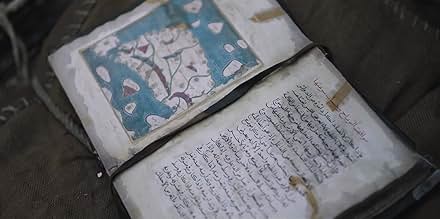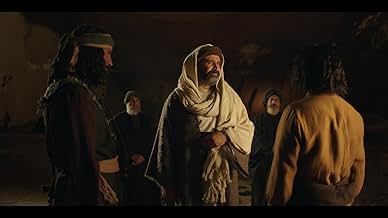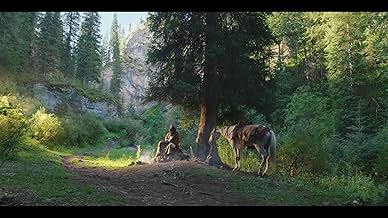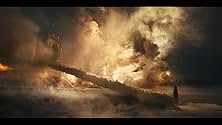IMDb-BEWERTUNG
7,4/10
2988
IHRE BEWERTUNG
Das 11. Jahrhundert und das Auftauchen des Anführers der Gruppe El Hashaashun, Hassan Al SabahDas 11. Jahrhundert und das Auftauchen des Anführers der Gruppe El Hashaashun, Hassan Al SabahDas 11. Jahrhundert und das Auftauchen des Anführers der Gruppe El Hashaashun, Hassan Al Sabah
Folgen durchsuchen
Empfohlene Bewertungen
In fact, it is the first Arabic series or movie that I have seen, so the series is very acceptable for the country of Egypt in terms of narrative and history (apart from how close it is to reality) and it gets high marks, although I think that many of the images and the way of showing the events He copied movies and series such as Vikings, Lord of the Rings, and Game of Thrones, which of course gives a good feeling because these series and movies are very popular. In general, in my opinion, due to the high budget, airing time and narration of this series, it is completely political and purposefully tries to attribute it to the conditions of Iran and Shia and proxy groups.
Why are Iranian reviewers here pretending as if 11th century Persians weren't Muslim, as if the show doesn't directly talk about Khayyam's skepticism, and as if Hassan Sabbah was somehow protecting Persia from Islam even though he was an Ismaeil Shia Muslim, and as if the show is somehow distorting history and masquerading Persians as Arabs? Iranians put their patriotism and their hate for Islam before anything, and judge the show immediately rather than actually watching it, and these reviews are probably spammed by people who have not watched the show. It has great writing, great acting, great production, great costumes, great music, better than anything I've seen in Arab media for a long time. Even though there some inaccuracies for dramatic purposes, it's a great achievement for Arab production.
So far, I've watched 24 episodes of it, and visually, the series is incredibly powerful and truly enjoyable to watch as a viewer. However, when it comes to historical series, I'm always interested in hearing and seeing historical truths. This series, in terms of authenticity, is purely a fabrication. Many of the events depicted throughout the series are not compatible with recorded history, and with a simple search in historical books or even Google, you can realize this issue. For example, Nizam al-Mulk was born in 1018, Hasan Sabbah in 1050, and Omar Khayyam in 1048. So, it's impossible for these three individuals to be of the same age and make a pact with each other in their youth. Many other events in the series are also not in line with reality.
Although Hasan Sabah was considered a controversial leader by many Muslims, he was undoubtedly a patriot who endeavored to undermine the Seljuks and Arabs in an effort to revitalize the Iranian empire. On the other hand, Hamid al-Ghazali, a devout Muslim, was strongly opposed to secular knowledge and philosophy, which led him to advocate against the spread of philosophical teachings among Muslims.
Moreover, there is a significant error concerning the supposed friendship between Khayyam, Hasan Sabah, and Nizam al-Mulk. Historically, Hasan Sabah was 17 years younger than Khayyam, and Khayyam was 21 years younger than Nizam al-Mulk, making it highly unlikely that these three dignitaries could have had a friendship.
Although the series is well-directed and cities like Samarkand and Isfahan are depicted beautifully, portraying Hasan Sabah as a villain does not seem fair.
Finally, I hope that someday a movie will truly portray Hasan Sabah accurately.
Moreover, there is a significant error concerning the supposed friendship between Khayyam, Hasan Sabah, and Nizam al-Mulk. Historically, Hasan Sabah was 17 years younger than Khayyam, and Khayyam was 21 years younger than Nizam al-Mulk, making it highly unlikely that these three dignitaries could have had a friendship.
Although the series is well-directed and cities like Samarkand and Isfahan are depicted beautifully, portraying Hasan Sabah as a villain does not seem fair.
Finally, I hope that someday a movie will truly portray Hasan Sabah accurately.
First of all, I would like to thank the Egyptian crew who made this series. This should indeed have been made by Iranians, but our government is too busy with its corruption that Iran's history has the least importance, so we should be grateful that this series was made.
It is crucial to address the false claims made by some Iranians regarding this series. They argue that Hasan Sabbah is portrayed as an Arab, but it is clear that the actors identify themselves as Persians. It is essential to understand that during the time Iran was ruled by Arab rulers, people had converted to Islam, and most spoke Arabic as well as Parsi language. Hence, it is evident that the show accurately depicts the historical context of the period. Furthermore, the claim that Sabbah was against Islam is entirely baseless as he was a devout Muslim himself. Those who make such unfounded assertions should watch the series with an open mind and refrain from spreading misinformation.
It's important to remember that Khayyam's religious beliefs have been a subject of debate, but some have claimed that he was not a Muslim, he was though maybe not a practicing one and in one of the episodes, Sabbah himself stated that Khayyam will always live with doubt, just as he did, and challenged God and his justice in his poems.
Having watched the four episodes myself, I can confidently say that they haven't shown anything that insults us Iranians or our history..
As an Iranian, it's time to face the reality that our culture is not what it used to be 2500 years ago. We have been under Islamic rule for centuries now, and it has transformed us to be like any other Middle Eastern country. While we may not speak Arabic, the similarities are far more than the differences. It's time to accept this fact, if you don't like it, then change yourself first.
It is crucial to address the false claims made by some Iranians regarding this series. They argue that Hasan Sabbah is portrayed as an Arab, but it is clear that the actors identify themselves as Persians. It is essential to understand that during the time Iran was ruled by Arab rulers, people had converted to Islam, and most spoke Arabic as well as Parsi language. Hence, it is evident that the show accurately depicts the historical context of the period. Furthermore, the claim that Sabbah was against Islam is entirely baseless as he was a devout Muslim himself. Those who make such unfounded assertions should watch the series with an open mind and refrain from spreading misinformation.
It's important to remember that Khayyam's religious beliefs have been a subject of debate, but some have claimed that he was not a Muslim, he was though maybe not a practicing one and in one of the episodes, Sabbah himself stated that Khayyam will always live with doubt, just as he did, and challenged God and his justice in his poems.
Having watched the four episodes myself, I can confidently say that they haven't shown anything that insults us Iranians or our history..
As an Iranian, it's time to face the reality that our culture is not what it used to be 2500 years ago. We have been under Islamic rule for centuries now, and it has transformed us to be like any other Middle Eastern country. While we may not speak Arabic, the similarities are far more than the differences. It's time to accept this fact, if you don't like it, then change yourself first.
Top-Auswahl
Melde dich zum Bewerten an und greife auf die Watchlist für personalisierte Empfehlungen zu.
Details
- Erscheinungsdatum
- Herkunftsland
- Offizieller Standort
- Sprache
- Auch bekannt als
- El Hashaashun
- Weitere beteiligte Unternehmen bei IMDbPro anzeigen
- Farbe
Zu dieser Seite beitragen
Bearbeitung vorschlagen oder fehlenden Inhalt hinzufügen





















